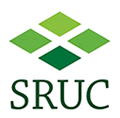Around 6% of beef calves die early in life. Calf morbidity and mortality represents a significant economic, environmental, reputational and welfare cost. Two key determinants of failure to thrive are calving difficulty and poor calf vigour, both of which may be affected by the mother’s body condition (fat reserves) during gestation and at birth. This project aims to understand the effect of poor body condition on cow hunger, calving ease and calf vigour. It will also test a method to predict which cows will lose too much condition and a method to prevent the worst effects of poor condition.
It is currently recommended that spring calving beef cows lose body condition during pregnancy to minimise winter feed costs, but 30% of cows lose more condition than recommended. SRUC data from 40 UK farms found a link between cow body condition and the size of the calf at birth and its subsequent growth, suggesting that condition may affect calf vigour. The project will survey Scottish and Irish farmer uptake of condition scoring (Objective 1). It will quantify the biological effects of absolute body condition, or changes in condition over time, on cow hunger (feeding motivation) (Objective 2) and subsequent calving ease and calf vigour (Objective 3). It will also test the efficacy of predicting condition loss based on easily implemented measures of temperament previously linked to growth (Objective 4). Lastly, reactive treatment of calves identified to have poor vigour occurs too late to prevent negative impacts on immunity and subsequent development. Non-steroidal anti-inflammatory drugs (NSAIDs) administered following calving can improve cow welfare and calf weight gain in early life. Objective 5 will test the effectiveness of targeting NSAIDs towards cows (and/or their calves) whose condition profile puts their calf at risk of poor vigour.
The project will provide basic biological understanding of the effects of inappropriate body condition and a route towards better prediction and treatment of these effects to improve animal welfare, production efficiency and the large climate impact of the beef sector. The studentship is a collaboration between SRUC, the University of Edinburgh and Teagasc in the Republic of Ireland. The project will be based at SRUC near Edinburgh and will include short periods of data collection in Ireland. The student will gain first-hand experience of two farm-based and two academic teams. They will be mentored in engaging with industry and will play an active part in knowledge exchange.
Apply
Visit PhD opportunities | SRUC
Please fill out the application form and equal opportunities form and send it along with your academic qualifications to [Email Address Removed], quoting reference SRUC/EW.
Please send the academic reference form to two academic/professional referees, and ask them to submit it by the deadline mentioned above to [Email Address Removed].

 Continue with Facebook
Continue with Facebook



